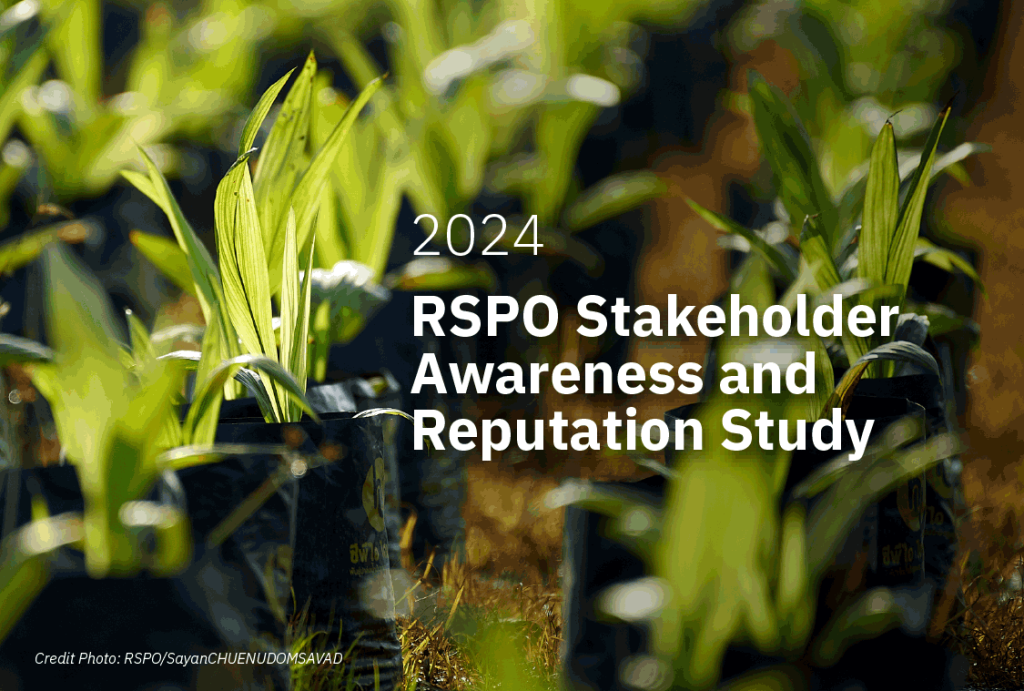
The findings of the second annual RSPO Stakeholder Awareness and Reputation Study were released in June 2024, showing an improvement of RSPO’s reputation from the previous year, as well as strong agreement regarding RSPO’s relevance, credibility and positive impact among survey participants. The survey also revealed a significant recognition of the impact of RSPO Certification in reducing deforestation risk and minimising the negative impact of palm oil cultivation.
The survey was carried out by global reputation research specialists, Echo Research, commissioned by RSPO to conduct an annual global reputation study across multiple stakeholder audiences for four consecutive years, starting in 2023. The main objectives of the study are to track familiarity, perceptions and reputation of RSPO, RSPO Certification, communications and stakeholder engagement, as well as to provide actionable insight for communications strategy and reputation management.
The key findings of the 2024 study are as follows:
- Improved reputation: RSPO has shown reputational improvement from 2023, with over three-quarters of participants perceiving it as good or excellent; reputation is strongest among oil palm growers.
- Excellent advocacy levels: The proportion of advocates far outweighs critics.
- Relevance and credibility: Strong agreement that RSPO is relevant, trustworthy, credible and has a positive impact.
- High scoring among growers: Oil palm growers have scored RSPO highest on all reputation attributes, while influencers outside the supply chain have scored it the lowest.
- On standards and certification perception, stakeholder engagement: Though still recognised by stakeholders as the primary standard and certification organisation, perceptions are weaker that RSPO provides an independent voice and is engaging stakeholders at the highest level.
- On certification credibility: RSPO Certification is perceived as being extremely credible but there is less agreement that monitoring and enforcement is enforced effectively and consistently; this in particular is seen as a weakness by influential stakeholders outside the supply chain.
- Positive impacts of certification: The impact of RSPO’s Certification in reducing the risk of deforestation and minimising the negative impact of palm oil cultivation is widely recognised. There is less recognition that certification reduces investment risk in the sector.
- On communication and engagement: Three quarters of participants rate the quality of RSPO’s communication and engagement positively, but there is room for improvement with all stakeholders
- On government engagement: A third of participants are aware of RSPO’s government engagement activities, with over three quarters agreeing that it is effective
Key recommendations
In response to these key findings, Echo Research have offered recommendations for improved RSPO communications and engagement, including heightened responsiveness and frequency of engagement with stakeholders; more localised and targeted and tailored communications; increased engagement with national governments and intergovernmental organisations, improved smallholder inclusion – including working with governments to invest in smallholder capacity building and training subsidising the cost of RSPO Certification; and adopting a more proactive outreach and member engagement sessions for educational and supportive resources.
The RSPO Market Transformation team would like to extend its gratitude to all those who participated in this second global survey, the input and insights of which are highly valuable in helping measure awareness and reputation. In response to the key findings, RSPO will be developing an action plan in due course, based on the insights and feedback from this survey.
The second study follows the initial survey carried out in 2023, whose results served as a baseline for the subsequent study in 2024.
To view the results, kindly click here.
For any questions regarding the survey, please contact: [email protected]
Keep reading

Book Your Slot for the Additional prisma Clinic Session at RT2025

Advancing Jurisdictional Certification in Sabah: Strengthening Collaboration Between RSPO, UNDP, and Jurisdictional Approach System for Palm Oil (JASPO)
Call for Expression of Interest: Independent Investigation of a Complaint

Leading Labels: RSPO Among Top Sustainability Labels in Dutch Market

The 21st International Oil Palm Conference Successfully Took Place in Cartagena, Colombia

Top Performers of the 2025 Shared Responsibility Scorecard

ACOP 2024: RSPO Market Trends Resilient Despite Global Challenges

RSPO: Actions for the Certification of Sustainable Palm Oil Production




